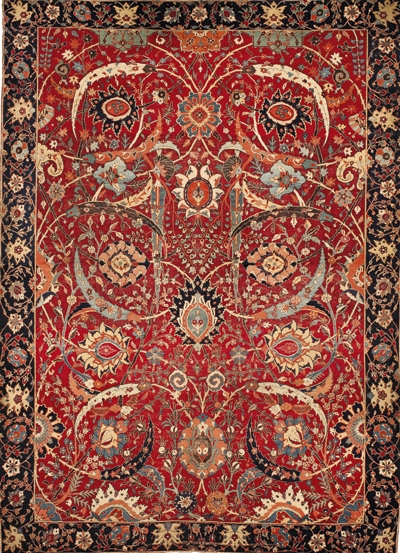It is a desperate state of affairs when museums and art galleries sell outstanding works of art in order to raise funds. It is even worse, perhaps, when they do so because they no longer want them. Next month, on 5 June, Sotheby’s New York is offering some 25 classical carpets on behalf of the Corcoran Gallery of Art in Washington DC, which includes what the auction house describes as ‘one of the most important and revered carpets in the world’. No one taking the trouble to contemplate the 17th-century Isfahan ‘Clark Sickle-Leaf Carpet’ (right) for more than a minute could fail to be entranced by it, or to recognise that this most beautiful and astonishingly complex of textiles is a remarkable work of art. That is, in one sense, precisely why it is being sold.
Such a sale is alarming for several reasons, not least because it may represent just the tip of an iceberg. In 1925, Senator William A. Clark bequeathed some 997 predominantly European fine and decorative arts to the gallery William Corcoran had founded in 1869. Yet there is no mention of this or any of the gallery’s European holdings in the Strategic Framework for a New Corcoran issued by its board of trustees in April. It seems that the current regime has decided to revise the museum’s mission, as American museum trustees are wont to do. The gallery will now narrow its focus to contemporary art, American art and, a new category, design.
This strategic plan was prompted by the financial difficulties of the privately endowed Corcoran Gallery of Art and College of Art + Design, and its process included identifying the institution’s core mission. This is the latest example of what could be called ‘museum mission creep’, an exercise offering an automatic green light to justify sometimes radical change — and cash in the coffers for future, and more fashionable, acquisitions.
The Corcoran is, of course, not the first American institution to deaccession. In the post-war years, major museums took to selling collections en bloc — Minneapolis alone selling 4,500 items. Since then, the Association of Art Museum Directors has issued professional guidelines (my italics) on what might legitimately be sold — essentially duplicates, poor-quality items and works with condition issues — and advocating that no funds realised be spent on capital or operational expenses. But even these allow for the sale of work ‘no longer consistent with the mission or collecting goals of the museum’. Restrictions that preserve the historical character of a collection are rare.
In 1989, for instance, the Walker Art Center in Minneapolis decided to sell its entire holding of 19th-century American art to enhance its endowment for 20th-century art. In 2007, the Albright-Knox Gallery in Buffalo offloaded outstanding antiquities in order to buy modern and contemporary. Those sales realised $68 million. Such is the scale of this deaccessioning that both Christie’s and Sotheby’s now have dedicated museum liaison departments. Institutional collections are proving one of the richest seams of supply for the current art market.
The dangers of these disposals are self-evident. It is hard to imagine that potential donors are not alarmed by this kind of trading in, for even stipulations on gifts have been overruled in the courts. There is also the issue of overconfidence in current taste and curatorial interests. Certainly, the Corcoran’s curators would be extraordinarily fortunate, and prescient, to acquire works of art of a quality comparable with that of the ‘Clark Sickle-Leaf Carpet’.
This tour-de-force represents the pinnacle of Persian carpet weaving under Shah ’Abbas in the late 16th and early 17th century. Probably woven in Kirman, its rare ‘vase’ technique, which uses three weft ‘shoots’ — two of wool and cotton, and one of silk — allows for a particularly fine weave and crisp drawing, and its vitality lies in its vivid palette and dynamic patternmaking over three pictorial planes. Swirling, intertwining and overlapping vine leaves and flowering and fruiting branches are overlaid with curling serrated ‘sickle’ leaves and palmettes, and pierced by cypress trees. A real paradise garden, it comes to the block with a relatively conservative estimate of $5 million to $7 million — the current record price for any carpet sold at auction, £6.2 million ($9.5 million), was set in 2010 for a later and less complex ‘vase’ carpet. In this particularly polarised market, rare, early examples are now commanding huge prices from buyers across the globe.
The Corcoran’s chief curator Philip Brookman argues, not unreasonably, that carpets are ‘very much outside what we do — we have no Islamic art, no curatorial expertise for it, and no way of showing it in relation to the rest of our collection’ (one is being retained as an example of Clark’s collecting interests).
His comments highlight the contrasting attitudes to so-called permanent collections in the US and in Europe, where deaccessioning is not an option. But before anyone here thinks of gloating, they ought to reflect that, while national museums do not deaccession, there are no restrictions on regional collections belonging to local councils or other institutions. As I write, Tower Hamlets Council in London would sell a monumental Henry Moore if it could prove legal title, Northampton Borough Council is considering the sale of a 2400 BC Egyptian figure, while some members of Southampton City Council remain in favour of disposing of works from the city’s art gallery to help develop a new cultural quarter. Meanwhile, Bournemouth and Poole College quietly disposed of part of its art collection last year — including another Henry Moore bronze — to fund new facilities. It is not only money — or the lack of it — that can have a transformative effect on a museum or art gallery; it is the trustees and the councillors who hold the purse strings.






Comments